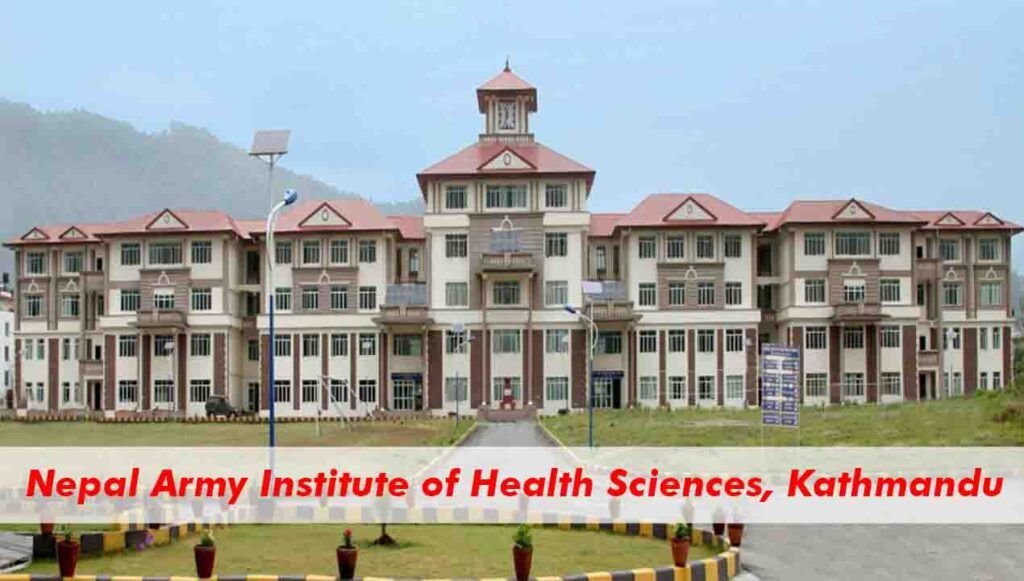
The Nepal Army Institute of Health Sciences (NAIHS) was founded in 2067 BC and is a nonprofit organization. It was based on the idea that Nepalese people had a pressing need to upgrade the patient care system provided by the Nepalese Army Medical Corps, which could be accomplished by igniting the medical potential of healthcare experts with a self-sustaining academic center.
Apply Now
The First World War created a significant demand, and the institute was created in memory of the fallen warriors. It was the first hospital to set up a semi-automatic pathology lab and offer fiber optic endoscopic services. The Nepalese Army Welfare Fund provides funding for Nepal Army Institute of Health Sciences, which is run by the Nepalese Army Welfare Planning Directorate. This institute is home to a number of colleges, including the colleges of medicine and dentistry.
About Nepal Army Institute of Health Sciences
| Name of The University | Nepal Army Institute of Health Sciences, Kathmandu |
| University Type | Private Institution |
| Established Year | 2012 A.D |
| Number of Courses | 18 Medical Programs under NAIHS, College of Medicine, 4 Programs under NAIHS, College of Nursing, and 5 Programs Under NAIHS, College of Medical Polytechnic. |
| Tuition Fees Range | From 3 lakhs to 44.3 lakhs depending on the course. |
Nepal Army Institute of Health Sciences Ranking
One of the leading medical schools in Nepal is the Nepal Army Institute of Health Sciences (NAIHS). It is succeeded by Nepal Medical College as the ninth-best medical college and university in Nepal.
Study MBBS in Nepal
The MBBS program in Nepal typically follows a structured curriculum, and I’ve simplified the information you provided for easier understanding:
Academics of Nepal Army Institute of Health Sciences
- Duration: Four and a half years, followed by a 1-year compulsory residential rotating internship.
- Language of Instruction: English
Preclinical Curriculum (Semesters 1-4)
- First and second years include subjects like Anatomy, Microbiology, Pathology, Pharmacology, and Physiology.
- These subjects are integrated and taught alongside Community Medicine and Introduction to Clinical Medicine.
- Medical Informatics is integrated to provide computer expertise relevant to medical education.
- University examinations are held at the end of the first and second years.
- Students must complete all preclinical subjects within specified timeframes.
Clinical Sciences (Semesters 5-9)
- Clinical subjects include Forensic Medicine, Community Medicine, Ophthalmology, Medicine & Allied Subjects, Psychiatry, Dermatology, Radiology, Emergency Medicine, Obstetrics & Gynecology, Pediatrics, and other specialties.
- Third-year university examinations are held for Forensic Medicine, Community Medicine, and Ophthalmology.
- A student cannot progress to the ninth semester without passing these subjects.
- Ninth semester includes final university examinations in Medicine, Surgery, Obstetrics, Gynecology, and Pediatrics.
Evaluation
- Continuous evaluation is conducted through fortnightly tests, semester exams, end-posting evaluations, seminars, and problem-based learning sessions.
- The continuous evaluation system contributes to excellent results in university examinations.
Teaching Methodology
- Preclinical teaching includes didactic classroom lectures, practical sessions, problem-based learning (PBL) sessions, and community/hospital visits.
- Seminars and PBLs are conducted every fortnight to provide clinical orientation.
- Clinical teaching involves practical training in hospitals, community visits, symposia, seminars, clinical meetings, faculty talks, and guest lectures.
- An emphasis is placed on clinical practical training.
Internship
- A one-year rotating internship is compulsory.
- Different internship schemes are approved for students from various countries.
- Internships can be completed in Nepal, India, Sri Lanka, Australia, USA, UK, and South Africa.
- Internship rules are subject to change based on the regulations of the Medical Council of Nepal.
Admission Procedure For Nepal Army Institute of Health Sciences
- Application forms for admission into medical colleges in Nepal are typically available in September/October.
- Applicants can collect these forms from authorized centers in India and abroad.
- The filled application form should be accompanied by various documents, including a passport or Aadhar card, a recent passport-size photo, and attested copies of 10th and 12th-grade mark sheets.
- An application fee of INR 5000 payable to the Medical Education Commission, Nepal, is required.
- If applying for direct admission based on NEET scores, candidates need to include their NEET scorecard.
Notes:
- The MEC entrance exam is conducted only in Nepal, so applicants from other countries need to travel there to take the exam.
- If there are more applicants through the MEC entrance examination compared to direct NEET admission, priority will be given to candidates who have qualified through the entrance exam.
Eligibility Criteria For Nepal Army Institute of Health Sciences
Admission to medical colleges MBBS in Nepal for Indian students follows two main pathways: one through an entrance examination conducted by the Medical Education Commission (MEC) and the other through direct admission based on NEET scores for Indian students. Here’s a simplified explanation:
Direct Admission Through NEET Scores for Indian Students:
- Indian students seeking direct admission to private medical colleges in Nepal can do so based on their NEET scores.
- The MBBS course duration is 4.5 years, followed by a 1-year internship.
- Eligibility criteria include passing 10+2 with Physics, Chemistry, and Biology with a 50% aggregate or equivalent grades from certificate-level programs.
- Candidates should be at least 17 years old by the application deadline.
Admission Through MEC Entrance Examination:
- Students interested in studying MBBS in specific Nepalese institutions like BP Koirala Institute of Health Science, Dharan Institute of Medical Science, Patan Academy of Health Science, Kamali Academy of Health Science, Nepalese Army Institute of Health Science, and Kathmandu University School of Medical Science need to take the MEC entrance examination.
- To qualify, candidates must score a minimum of 50% in this entrance exam.
- Only NEET scores from the current academic year will be considered for admission.
- The minimum NEET score required for general category candidates will determine their eligibility.
Documents Required For Nepal Army Institute of Health Sciences
- Passport
- 10th mark sheet and certificate.
- 12th mark sheet and certificate.
- Birth certificate
- 10th passport-size photographs
- Official invitation letter from the Nepal Army Institute of Health Sciences.
- Verified documents from the Ministry of External Affairs, New Delhi
- Verified documents by the Nepal Embassy.
- Visa fees
- Bank receipt of the paid tuition fee of 1st year.
Advantages of Studying at Nepal Army Institute of Health Sciences
- The Nepal Army Institute of Health Sciences (NAIHS) was founded in 2067 BC and is a nonprofit organization.
- It was based on the idea that Nepalese people had a pressing need to upgrade the patient care system provided by the Nepalese Army Medical Corps, which could be accomplished by igniting the medical potential of healthcare experts with a self-sustaining academic center.
- The First World War created a significant demand, and the institute was created in memory of the fallen warriors.
- It was the first hospital to set up a semi-automatic pathology lab and offer fiber optic endoscopic services.
- The Nepalese Army Welfare Fund provides funding for Nepal Army Institute of Health Sciences, which is run by the Nepalese Army Welfare Planning Directorate.
- This institute is home to a number of colleges, including the colleges of medicine and dentistry.
Faculty & Staff
Nepal Army Institute of Health Sciences in Nepal offers a wide array of facilities to cater to the diverse needs of its students. These encompass a dedicated medical center to address health concerns, a comprehensive library to support academic research, a spacious auditorium for various events and gatherings, comfortable hostel options for accommodation, advanced computer labs for technology-driven learning, sports facilities to promote physical well-being, a convenient cafeteria for dining, and well-equipped laboratories for practical experiments and research. These facilities collectively contribute to creating a conducive and enriching environment for both academic and personal growth.
Student Support
Nepal Army Institute of Health Sciences offers a range of support services for its students. These services include anti-ragging measures to ensure a safe environment, counseling services for guidance and support, access to healthcare facilities, assistance with hostel accommodations, a platform for reporting issues and asking questions, and even local language learning classes. Whether you need help with personal or academic matters, we are here to provide the support you need during your time at the college.
Conclusion
AR Group of Education offers a range of services to students seeking higher education abroad. These services include:
Counseling: Our team of professionals with over a decade of experience provides unlimited counseling support to students throughout their journey with us. We guide students through the entire process, ensuring a smooth admission process.
College Selection: We maintain an updated list of colleges that are ideal for Indian students looking to study MBBS in Abroad. From recommending the best college to providing “done for you” services, we offer:
a) Scholarship guidance – Our team keeps up-to-date with ongoing scholarship programs and assists students in availing them.
b) Seat locking – We have tie-ups with top medical colleges in Nepal and other countries, ensuring students don’t miss an opportunity to secure admission to their dream college.
c) Travel/Visa Assistance – We understand the complexities of travel and visa procedures and thus offer students our assistance throughout the entire process, ensuring smooth travels.
FAQs:


















